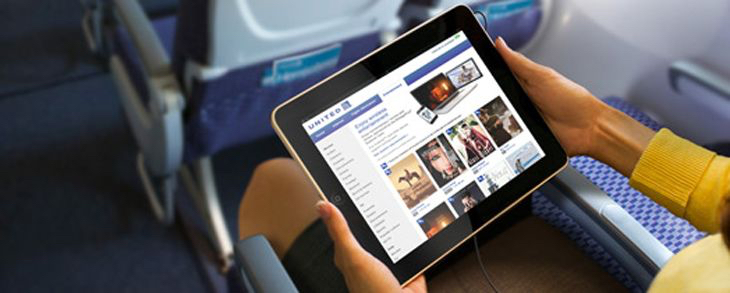NY Times technology columnist Farhad Majoo argues that technology has failed to improve your airline experience.
His thesis–
Yet the airline industry has not just stubbornly resisted innovation to improve customer service — in many ways, technology has only fueled the industry’s race to the bottom.
As evidence, he points to United3411:
Everything about United Flight 3411 — overselling, underpaying for seats when they are oversold, a cultish refusal to offer immediate contrition, an overall attitude that brutish capitalism is the best that nonelite customers can expect from this fallen world — is baked into the airline industry’s business model. And that business model has been accelerated by tech.
He adds that airfare search engines sort based upon price, machines are replacing the personal touch of workers, and any useful metric of “dignity” is lacking.
Airline industry analyst Henry H. Harteveldt weighs in, stating, “The airline industry has been on a steady downward trajectory when it comes to customer service for nearly 40 years”
We sparred on NPR and he is wrong again here. Customer service is hardly on a steady downward trajectory. Rather, we see cases of strong and positive leadership and cases of poor leadership. Why are Southwest, Alaska, and Delta so highly regarded in the customer service department? Because they provide excellent customer service that has improved. More importantly, though, customer service must be thought of as more than just being courteous.
Harteveldt (correctly) admits it that consumers care primarily about price and airlines have responded accordingly. Yet that doesn’t concede that some carriers are still able to provide far better customer service than others. It also doesn’t concede the many areas in which customer service has improved even as price has been a primary motivator in courting customers.
So no hope?
Majoo speculates about the possibility of membership-based airline fees, sort of like the way Netflix transformed the DVD rental market. I cannot see a viable membership-based business model, though.
He arrives at this final conclusion–
Your only technological hope for better service is your smartphone camera and the viral push of social networks. If you are violently kicked off your flight, at least your fellow passengers will post a video to Facebook.
That’s just not correct. While viral incidents do bring about changes in customer service, the best push remains competition. Bucking the “race to the bottom” mantra, we’ve seen carriers improve the in-flight experience, not downgrade it. Wireless internet, streaming movies and videos, power outlets at every seat, and edible airline food mean much more to me than a plusher seat or an extra inch or two of legroom. I’d imagine I am not the only one.
My United mobile app allows me to search and book flights, upgrade, change seat assignments, and rebook myself during irregular operations. I can do this from anywhere in the world. That’s surely made my airline experience better.
CONCLUSION
The premise of this article is simply wrong. Customer service is improving in the areas in which customers care. I sure wouldn’t trade all that I have gained in the last 10 years of flying for more legroom and a free checked bag…





Well, I’m 6-4 and would dearly love to dump most airline-providwd technology gains for a seat a few inches wider, more legroom and seat cushions that actually cushion. Airline app? Phhhtt. Mostly worthless. Wifi? Who really cares? IFE? Mostly crap content on crap screens (I bring my own tablet, my own noise-cancelling bose, with my own content). My flying experience would only be marginally different without technology provided by the airlines. But flying vastly nicer biz and F seats, with noise-cancelling earbuds has transformed my flying experience over the last few decades.
Sounds like you are already taken care of by buying J and F seats?
The problem with these types of questions is that “customer service” means a thousand different things depending on who you ask. I’m short and skinny, so have the airlines improved my “customer service” through things like online check-in and self-bag tagging, allowing me to get to the airport 20 minutes later than before, even though the seats aren’t as comfortable? I’d say yes, because 20 minutes of my time is more valuable than an inch of seat pitch, so the airlines are using technology to give me something of value. If you’re 6’4″ like the reader above, YMMV.
The real cause of customer service issues at airlines (and elsewhere) is the propensity of some employees to use “The Rules” to make problems go away rather than expending extra effort to help their customers with issues – even if that involves making up what “The Rules” are. Then, they use the power of “national security” to call the cops on anyone who raises questions, even when the employee is in the wrong. That has nothing to do with technology. Rather, fixing that involves addressing corporate culture and rooting out bad employees. Both are easier said than done.
I take his thesis to be that “in many ways, technology has only fueled the industry’s race to the bottom.” Modify “in many ways” to “in at least one vital way,” and he’s clearly correct. Technology readily allows us to compare fares across many airlines, permitting us to select the cheapest fares. Leisure travelers are extremely cost-sensitive, thus compelling the majors to compete on cost, rather than service or amenities. Hence, technology helped fuel the race to the bottom-line fare, with the attendant cost and service cuts. Sure, technology helps in other ways. In fact, there were websites that returned flight searches based on seat pitch, and passenger reviews. However, I think fare remains the primary driver for leisure travelers.
Please don,t suggest legroom doesn’t matter. Width of the seats too is a huge issue. That to me would be great customer service. ….not cramming us in like sardines.
Want more, pay a little more? First Class has dropped greatly in price and all carriers have extended legroom sections.
Matthew, the problem with suggesting that people pay for first class is that United doesn’t always respect the money you paid for the ticket. For example, my flight was late arriving in Denver and I had a paid United First ticket. I missed my next flight and the agent promptly put me in coach on another flight. I complained, and she said I didn’t have a “real” first class ticket, no matter what my United.com confirmation said. I complained to a supervisor, who got me in first class and who told me my ticket was, in fact, “real.” About half of all United’s domestic first class passengers get their first class seats as free upgrades, and a lot of the company’s agents seem to make little distinction between those who bought their first class tickets and those who got them as free upgrades. I thought I was doing an honorable thing by paying for first class rather than begging for a freebie, but that agent didn’t seem to care one way or another. I have been paranoid about flying domestic first class on United ever since. The situation with overseas business class seems to be different. United agents have always seemed to respect my position on those paid tickets, probably because so few business class seats are given as free upgrades.
Matthew, I actually think that an inch or two of legroom makes a world of difference. I am 6 feet tall, and at that eight a 31 inch pitch is tight and 32 inis comfortable.
Rubbish. You show yourself as a lackey of carriers. Airlines jam rows closer together and generally making economy class so unbearable in order to sell vastly over priced premium economy seats to those able and willing to pay. The contempt airlines show to the vast majority of their customers (non elite members in economy) is disgusting. A power outlet in my seat doesn’t make up for that. And your ability to rely on airline apps to save your skin is vastly overstated. How much good did an app do two weeks ago when Delta’s antique computer systems became overloaded due to weather disruption? US airlines need to re-regulated or to face full on competition by allowing foreign carriers on domestic routes and by reallocating gate slots to break regional monopolies. At an absolute minimum the US needs a robust scheme of compensation (similar to the EU’s) as an incentive for carriers to invest in IT and to reduce the number and length of ‘operational delays’ (which are often caused by IT failures or airlines’ decisions to hold flights for passengers’ they deliver late to hubs.